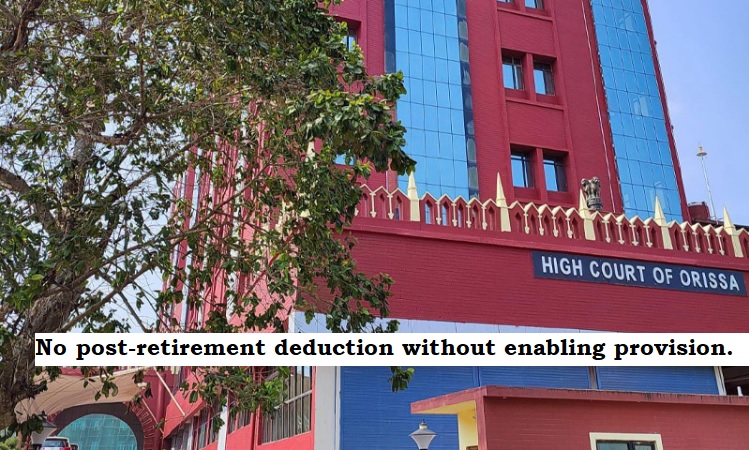


The Orissa High Court has emphatically restated that in the absence of a specific rule or provision, no departmental proceedings can persist against an employee, nor can any deductions be made from their retirement benefits once they have retired from service, particularly if a departmental inquiry is still pending. This assertion was made while delivering relief to a retired academician by the Single Bench of Justice Biraja Prasanna Satapathy.
The court's decision was grounded in the understanding that since the proceedings against the petitioner could not be concluded before his scheduled superannuation on August 31, 2015, they cannot be prolonged in the absence of any enabling provision, either under the 1974 Rules or the 1981 Rules.
The case pertained to a retired academician who, during his tenure as a Reader in English at S.G. College, Kanikapada, had a departmental proceeding initiated against him under the Orissa Education (Recruitment and Conditions of Service of Teachers and Members of the Staff of Aided Educational Institutions) Rules of 1974. Although the proceedings began while the petitioner was still in service, they remained unresolved until his superannuation. Consequently, the petitioner contended that the ongoing proceedings should be quashed as there was no provision within the rules allowing for the continuation of proceedings after retirement.
The court highlighted a consistent legal principle that, in the absence of explicit provisions in the service rules, neither can departmental proceedings be sustained nor can deductions from retirement benefits or pensions be made after an employee retires from service. The court emphasized, "Law has been settled holding that no proceeding can be initiated after the superannuation of an employee unless there is any specific rule in that regard governing the employer or employee."
Furthermore, the court opined that for the termination of the employer-employee relationship after the premature superannuation of the petitioner, no disciplinary proceedings could be instigated. Citing precedents and a thorough examination of the rules, the court maintained that, as the proceedings against the petitioner could not be concluded during his service, they could not persist to his detriment after his superannuation.
In essence, the court underscored the importance of clear provisions within the service rules to dictate the continuation of departmental proceedings post-retirement. Without such explicit rules, any attempt to pursue proceedings or make deductions from retirement benefits would be legally untenable, safeguarding the rights of employees even after their official service concludes. This decision by the Orissa High Court reinforces the principle that procedural fairness must be upheld, and the absence of enabling provisions precludes the continuation of disciplinary actions after an employee's retirement.
TAGS: Orissa High Court Departmental proceedings Retirement benefits Enabling provision Employee rights Superannuation Academician Rules and regulations